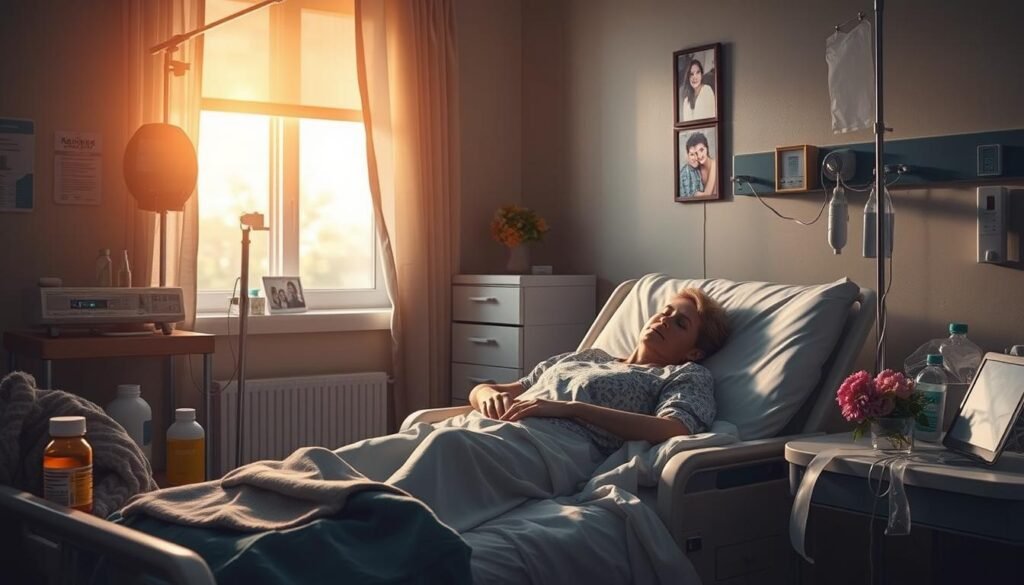Up to 30% of cancer survivors deal with exhaustion. It feels like being restless at night and tired all day. This deep tiredness affects recovery and day-to-day life greatly. Knowing the duration of chemo fatigue is key for those going through cancer treatment.
Studies show that recovery might need two months for every month of chemo. This means fatigue can last a lot longer than expected. Energy levels might improve in six to twelve months after treatment ends. It’s vital for patients to talk to their doctors. This helps set clear recovery timelines. For more details on handling this tiredness, visit managing cancer-related fatigue.
Key Takeaways
- Chemo fatigue can last much longer than expected, often extending well beyond treatment.
- Recovery may take up to two months for each month of chemotherapy received.
- Fatigue impacts daily life and can significantly affect mental and emotional well-being.
- Staying in touch with healthcare providers is vital for effective management of fatigue.
- Energy improvement can take 6-12 months after completing treatment.
Understanding Chemo Fatigue
Chemo fatigue is a major issue for many cancer patients. It’s a deep tiredness that’s more intense than just feeling sleepy. This kind of fatigue can make daily life really tough, affecting both body and mind.
What is Chemo Fatigue?
Chemo fatigue is extreme tiredness that doesn’t get better with sleep. It hits people getting chemotherapy. This fatigue might come from the treatment or the cancer itself. For many, dealing with this tiredness is key to their recovery.
Symptoms of Chemo Fatigue
The warning signs of chemo fatigue are important to know. They include:
- Severe exhaustion that doesn’t go away.
- A heavy feeling in your arms and legs.
- Having trouble focusing or staying sharp.
- Feeling emotionally upset or mood changes.
Talking to your doctors about these symptoms is crucial. This conversation can help create plans to manage side effects. It aims to improve life during chemotherapy.
The Duration of Fatigue
Understanding how long fatigue lasts for cancer patients on chemotherapy sheds light on their recovery. The duration of cancer fatigue changes from person to person. The treatment type, overall health, and lifestyle impact fatigue levels.
How Long Does Chemo Fatigue Last?
Fatigue from chemotherapy usually starts within a few days after treatment. It can last weeks to months for many. Some may feel tired for years after finishing treatment. Almost everyone going through chemotherapy feels tired. However, most get their energy back within six months to a year.
Comparing Recovery Times for Different Treatments
The recovery from chemotherapy tends to take longer than other cancer treatments like surgery or radiation. After surgery or radiation, patients often feel better in weeks. However, getting over chemotherapy might take about two months for every month of treatment. Here’s a quick comparison:
| Treatment Type | Expected Recovery Time |
|---|---|
| Chemotherapy | Energy levels may stabilize within 6 months to 1 year |
| Surgery | Improvements seen within weeks |
| Radiation | Usually recover within weeks |
| Hormone Therapy | Fatigue decreases over a few weeks |
| Targeted Therapy | Recovery may take a few months to a year |
Factors Affecting Chemo Fatigue
Cancer-related fatigue deeply affects the quality of life for those in treatment. By understanding the factors behind chemo fatigue, it’s easier to find ways to fight it. There are physical and emotional elements to consider.
Physical Factors
Many physical factors affect how tired you feel during chemo. Over 80% of those treated for cancer feel very tired. The main contributors include:
- Low blood counts: Treatment may cause anemia, which lowers oxygen in the body.
- Sleep disturbances: Many have trouble sleeping, making them feel more tired.
- Surgery impact: Recovering from surgery can add to the fatigue, especially with other treatments.
- Side effects of treatment: Nausea, pain, and hot flashes can make the tiredness worse.
Eating well and staying hydrated are key to handling tiredness. For deeper insights, check this cancer fatigue management resource.
Emotional and Mental Health Factors
Your emotional health affects fatigue too. Emotional factors that impact chemo fatigue include:
- Anxiety and depression: Struggling with mental health can make you feel more tired.
- Chronic stress: Being under a lot of stress can wear you out.
- Medication side effects: Pain meds might also lead to feeling tired.
Tracking when you feel most tired can help your doctors help you better. Understanding your fatigue helps find the right approach to treat it effectively.
Chemotherapy Side Effects Beyond Fatigue
Chemotherapy side effects are more than just tiredness. Knowing all the possible symptoms is key for anyone going through treatment. Fatigue is often made worse by other symptoms. So, it’s important to deal with these extra challenges.
Common Side Effects of Chemotherapy
Chemotherapy affects patients in many different ways. Some common symptoms include:
- Nausea and Vomiting: These issues can last about 24 hours after treatment. This is especially true for higher doses or combination treatments.
- Loss of Appetite: Nausea and other factors can make it hard to eat well during treatment.
- Hair Loss: Patients may start losing hair 2 to 3 weeks after treatment begins. This includes hair on the scalp and other body parts.
- Diarrhea: This may begin shortly after treatment starts and can last two weeks.
- Constipation: Caused by hard stools, some chemo drugs can lead to this problem.
- Sore Mouth and Throat: Painful sores or ulcers can develop from the treatment harming fast-growing cells.
- Mucositis: This is when the mucous membrane gets inflamed, causing ulcers and other issues.
- Taste and Smell Changes: Changes in taste can affect what patients want to eat.
- Skin Issues: Patients might see redness, itching, and dry skin. They could also be more sensitive to the sun.
How Fatigue Interacts with Other Symptoms
Fatigue is linked with other side effects from chemotherapy. This makes dealing with treatment harder. Since fatigue can also be a sign of anemia, it adds to the feeling of being tired. Pain, nausea, and emotional stress can make fatigue even worse. Therefore, managing tiredness requires looking at the big picture. It’s important for patients to talk about all their symptoms with their doctors. This helps in understanding and managing their treatment better.

Post-Treatment Fatigue
Many cancer survivors face post-treatment fatigue. This fatigue can last months or years after treatment ends. A decrease in energy levels makes the chemotherapy recovery timeline harder. It’s key to understand this challenge for life after cancer.
What to Expect After Treatment
Expectations about fatigue vary after treatment. Some may slowly feel better, but others still feel tired. Anemia, lack of nutrients, and not enough water contribute to post-treatment fatigue. Talking with doctors about these symptoms is crucial for recovery.
Long-Term Impacts of Cancer Treatment Fatigue
Fatigue after cancer treatment can make daily tasks hard. This can lead to frustration and sadness. Keeping track of energy levels helps find what makes fatigue worse. Bone marrow transplant patients may feel tired for a long time. It’s essential to find ways to cope for a better life. The fatigue management guide has helpful tips.
Coping with Chemo-Related Tiredness
Chemo-related tiredness presents many challenges. Effective management often involves combining physical activity, good nutrition, and emotional support. This approach is holistic.
Strategies for Managing Exhaustion
To cope with chemo tiredness, several strategies can help:
- Engage in Regular Physical Activity: Simple exercises like walking, yoga, or stretching can boost energy.
- Prioritize Nutrition: A diet filled with fruits, vegetables, and lean proteins aids recovery and energy.
- Practice Mindfulness: Meditation and breathing exercises reduce stress and increase focus, helping those with chemo brain.
- Establish a Routine: Daily schedules add structure, making tasks easier and less overwhelming.
- Take Breaks and Rest: Taking needed breaks helps avoid exhaustion and keep energy up.
The Role of Support Networks
Support from friends and family is key in tackling chemo tiredness. Having a support system provides emotional relief and practical support. Consider joining:
- Peer Support Groups: Sharing experiences with others in similar situations offers valuable coping strategies.
- Counseling Services: Professional help can tackle the emotional side of fatigue and treatment.
- Family Involvement: Support from loved ones encourages sticking with routines and staying active.

Managing Chemo Exhaustion Effectively
Managing fatigue after chemotherapy involves physical activity, along with a good diet and nutrition. These elements work together to boost recovery during the tough times after treatment. They help patients regain their energy and cope with the effects of chemo.
Physical Activity: How It Helps
Regular physical activity is key in fighting off fatigue from chemotherapy. Experts recommend 3 to 5 hours of light exercise weekly, like walking or stretching. These exercises not only increase energy but also boost overall health. They make managing exhaustion easier, giving a sense of achievement and a happier mood.
Diet and Nutrition for Recovery
A balanced diet is crucial in recovering from chemotherapy. To maintain energy, it’s important to eat small, nutritious meals and snacks throughout the day. Drinking 8 to 10 cups of fluids daily is also vital for staying hydrated. Foods rich in nutrients give the energy needed for effective recovery. Focusing on diet and nutrition for recovery equips individuals to tackle daily hurdles and beat cancer fatigue.
| Activity | Benefits |
|---|---|
| Light Exercise (Walking, Stretching) | Boosts energy levels, improves mood, and enhances overall wellness |
| Hydration (8-10 cups daily) | Supports bodily functions, aids recovery, and combats fatigue |
| Balanced Diet | Provides necessary nutrients, stabilizes energy levels, improves health |
| Social Interaction | Offers emotional support, reduces stress, helps manage fatigue |
Chemo Fatigue Management Strategies
Dealing with chemo fatigue takes several steps that help improve your overall health. Using chemo fatigue management strategies eases symptoms for many. These include focusing on good sleep habits, learning to manage stress, and taking the right meds.
Sleep Hygiene Tips
Getting the same amount of sleep each night helps with fatigue. A peaceful place to sleep is key to sleeping well. Here are some tips:
- Maintain a regular bedtime and wake-up time, even on weekends.
- Create a comfortable sleep environment, including a dark and quiet room.
- Avoid stimulants, such as caffeine and nicotine, several hours before bedtime.
- Engage in relaxing activities before sleep, such as reading or gentle stretching.
Stress Management Techniques
Using stress management techniques can lessen fatigue during cancer care. Mindfulness, relaxation exercises, and deep breathing help lower stress and boost mood. Enjoying calming activities like yoga and meditation promotes both mental and physical calm.
Medication Management
Patients should know how their meds might affect fatigue. Talking with doctors to go over meds can pinpoint those that make you tired. Sometimes, changing meds improves energy. Medications like corticosteroids, psychostimulants, or anti-depressants might help with fatigue symptoms.

Overcoming Cancer Treatment Fatigue
Battling fatigue during and after cancer treatment is tough. It’s key to have realistic expectations for recovery. Patients should expect a slow healing process. It’s not just about physical health. Mental and emotional well-being are also important.
Setting Realistic Expectations for Recovery
After treatment, many feel tired for a long time. Having realistic expectations can ease frustration. For some, fatigue improves in a couple of months. However, others may feel tired for much longer. Starting fatigue management plans early can help.
Communicating with Healthcare Providers
Talking openly with doctors about fatigue is essential. Patients should explain how tiredness impacts their life. This helps tailor treatments to their needs. Options like exercise, therapy, or nutrition advice can fight fatigue.
Conclusion
Knowing how long chemo fatigue lasts helps cancer survivors plan their recovery. Fatigue varies from person to person. Some may feel tired for up to ten years after their diagnosis.
Good strategies and support from health teams make a big difference. Understanding why fatigue happens is key. For some, it lasts years after treatment ends. This shows why long-term care is vital.
Dealing with fatigue means getting the right support and knowledge. This way, people can get their energy back and live better. For more tips on fatigue, check out this article.